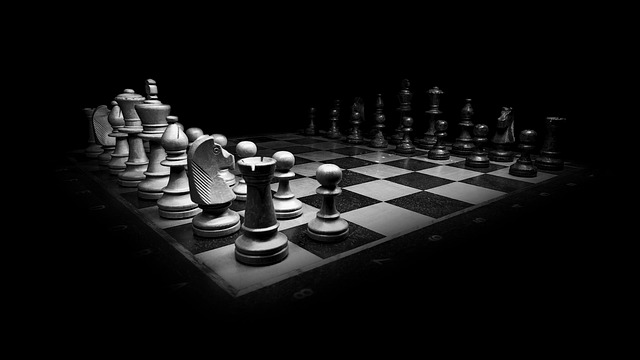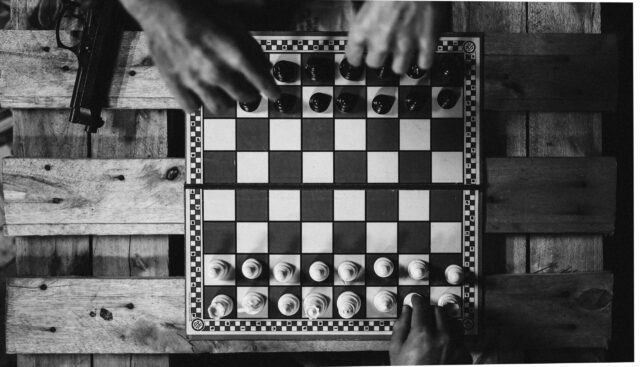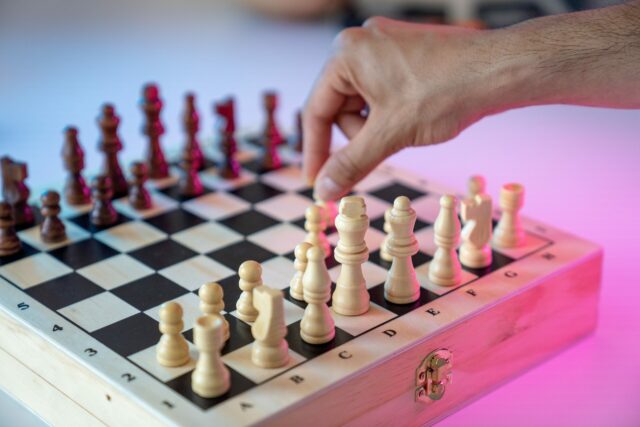Welcome to the world of chess, where every move carries the weight of strategy and calculation. If you’re looking to sharpen your chess calculation skills and take your game to the next level, you’ve come to the right place.
In this article, we’ll explore the best techniques and approaches to help you enhance your ability to calculate moves, anticipate your opponent’s moves, and make precise decisions on the chessboard. Get ready to unlock the secrets of strategic mastery and become a formidable force in the game of chess!
How can I develop a keen sense of calculation in chess?
To develop a keen sense of calculation in chess, immerse yourself in the world of tactics and puzzles. Solve a variety of chess puzzles regularly to sharpen your calculation skills and improve your ability to anticipate moves.
Additionally, analyze and review your own games to identify critical moments where accurate calculation would have made a difference.
Actively engage with the chessboard, visualizing the consequences of different moves and considering various alternatives. By consistently practicing and challenging yourself to think ahead, you’ll gradually cultivate a sharper and more intuitive sense of calculation in your chess games.
What are the essential principles behind accurate move calculation?

Accurate move calculation in chess is built upon several essential principles. Firstly, you must develop a strong understanding of the value and potential of each piece, allowing you to evaluate the consequences of different moves.
Secondly, learn to prioritize threats and opportunities, focusing on calculating critical variations that can significantly impact the outcome of the game.
Thirdly, consider the dynamics of the position, including pawn structures, piece coordination, and potential tactical motifs. By combining these principles with a systematic and disciplined approach to calculation, you’ll be able to make accurate and informed moves on the chessboard.
How can visualization techniques enhance my chess calculation abilities?
Visualization techniques can greatly enhance your chess calculation abilities. Practice mentally visualizing the chessboard and the positions that arise from different moves.
Develop the ability to vividly imagine future positions and variations, allowing you to explore different lines of play in your mind.
Use visualization exercises where you try to recreate entire games or solve puzzles solely in your imagination. By honing this skill, you’ll be able to calculate moves more efficiently during your games, as you’ll have a clearer picture of the potential outcomes and strategic possibilities.
What role does pattern recognition play in improving chess calculations?
Pattern recognition is a crucial element in improving chess calculations. By studying and analyzing a wide range of chess positions and games, you’ll start to recognize recurring patterns and tactical motifs.
These patterns can include common mating patterns, pawn structures, or piece configurations that often lead to specific tactical opportunities. By familiarizing yourself with these patterns, you’ll develop a quicker and more intuitive understanding of potential moves and threats on the board, enabling you to calculate moves more effectively.
How can I train my brain to calculate multiple moves ahead?
Training your brain to calculate multiple moves ahead requires consistent practice and mental discipline. Start by solving chess puzzles where you’re required to calculate several moves deep.
Focus on calculating accurately and visualizing the resulting positions. Gradually increase the complexity of the puzzles to challenge yourself further. During your games, consciously make an effort to think ahead and consider the consequences of your moves, as well as your opponent’s potential replies.
Over time, with dedicated practice and a structured thinking process, you’ll train your brain to calculate multiple moves ahead with greater ease and accuracy.
Are there any effective exercises to improve my tactical calculations?
Improving your tactical calculations requires engaging in effective exercises that challenge your ability to spot tactical opportunities. Solve a variety of tactical puzzles that focus on themes like forks, pins, skewers, and other tactical motifs.
Participate in tactical training sessions where you analyze and solve positions with time pressure. Play through annotated master games and try to identify tactical combinations that occurred.
What strategies can I employ to avoid calculation errors?
To avoid calculation errors, adopt strategies that promote careful and accurate thinking. Take your time during critical moments and resist the urge to rush through calculations.
Break down complex positions into smaller, manageable parts to analyze them more effectively. Double-check your calculations before making a move, paying attention to possible missed threats or tactical tricks.
Develop a habit of considering alternative moves and variations, assessing the risks and rewards of each option. By implementing these strategies, you’ll reduce the likelihood of calculation errors and make more informed decisions on the chessboard.
How can I enhance my ability to calculate complex endgame positions?

To enhance your ability to calculate complex endgame positions, focus on studying and practicing endgame principles. Familiarize yourself with fundamental endgame motifs, such as pawn promotion, opposition, and zugzwang.
Solve endgame puzzles that require precise calculation and evaluation of different move sequences. Analyze and play through annotated endgame examples from master games to gain insight into strategic thinking in the endgame.
By developing a strong understanding of endgame principles and honing your calculation skills in this context, you’ll be better equipped to navigate complex endgame positions and make optimal decisions.
What are the pitfalls to watch out for when calculating variations in chess?
When calculating variations in chess, it’s crucial to be aware of certain pitfalls that can hinder your accuracy. One common pitfall is tunnel vision, where you become fixated on a single line of play and overlook alternative moves or possibilities.
To avoid this, practice widening your perspective and considering multiple candidate moves. Another pitfall is overcomplicating calculations by delving too deep into intricate variations that may not significantly impact the outcome. Stay focused on assessing the key aspects of the position and prioritize calculating critical moves.
Additionally, be mindful of tactical oversights or missed threats that can arise when calculating variations. Cultivate a habit of double-checking your calculations and reassessing the position before making your final move.
Are there any specific tips for calculating tactical combinations?
When it comes to calculating tactical combinations in chess, a few tips can greatly enhance your accuracy and success. Firstly, start by identifying the tactical motifs present in the position, such as forks, pins, or discovered attacks.
This will help you spot potential tactical opportunities more efficiently. Secondly, break down complex combinations into simpler tactical elements and calculate them step by step. This approach makes it easier to accurately evaluate the consequences of each move.
Additionally, consider the principle of “forcing moves” – moves that create threats or force a specific response from your opponent – as they often lead to tactical combinations.
How does positional understanding contribute to accurate chess calculations?
Positional understanding in chess is a crucial factor that greatly contributes to accurate calculations. When you have a strong grasp of the underlying positional features, such as pawn structure, piece activity, and king safety, you can make more informed calculations.
Understanding the strengths and weaknesses of your own position and your opponent’s position allows you to assess the potential consequences of moves with greater precision.
Moreover, positional understanding helps you prioritize your calculations, focusing on moves that align with your strategic goals and exploit positional imbalances. By combining positional understanding with precise calculation, you’ll gain a deeper insight into the dynamics of the game and make more accurate decisions on the chessboard.
What are the benefits of analyzing master games for improving calculations?
Analyzing master games offers numerous benefits for improving your chess calculations. By studying games played by top-level players, you gain exposure to high-quality moves and tactical patterns. Master games provide a wealth of examples where accurate calculations played a pivotal role in the outcome.
Analyzing these games allows you to observe the thinking processes and calculation techniques employed by chess professionals.
Furthermore, studying master games helps develop your intuition and strategic understanding, which are essential components of accurate calculations. By immersing yourself in the rich tapestry of master games, you’ll absorb valuable insights that will refine your calculation skills and elevate your overall chess proficiency.
How can I leverage computer engines to improve my chess calculations?

Computer engines can be powerful allies in improving your chess calculations. Utilizing chess engines allows you to analyze positions with precision and depth that would be otherwise challenging to achieve.
When faced with complex positions, you can rely on computer engines to calculate multiple moves ahead and provide objective evaluations. Analyzing your own games or exploring variations with the assistance of engines helps identify calculation errors and overlooked tactical possibilities.
However, it’s important to use computer engines as tools for learning rather than solely relying on them. Strive to understand the reasoning behind the engine’s evaluations and incorporate those insights into your own calculation process. By leveraging computer engines effectively, you can enhance your analytical skills and gain a deeper understanding of complex positions.
Are there any recommended resources or books for honing calculation skills?
Several resources and books are invaluable for honing your calculation skills in chess. “Silman’s Complete Endgame Course” by Jeremy Silman is an excellent resource for improving both calculation and endgame understanding.
“Tactics Time! 1001 Chess Tactics from the Games of Everyday Chess Players” by Tim Brennan and Anthea Carson offers a vast collection of tactical puzzles suitable for players of all levels.
“How to Reassess Your Chess” by Jeremy Silman focuses on understanding imbalances and positional evaluation, which greatly contributes to accurate calculations. “The Art of Calculation” by Jan Timman delves into the intricacies of calculation and presents instructive examples.
How can I incorporate time management into my chess calculation process?
| Approach | Advantages | Considerations |
|---|---|---|
| Solving Chess Puzzles |
|
|
| Studying Master Games |
|
|
| Utilizing Computer Engines |
|
|
| Developing Positional Understanding |
|
|
| Engaging in Time Management |
|
|
Effective time management is vital when it comes to chess calculations. Allocating your time wisely ensures that you have sufficient opportunities to assess critical positions and calculate variations thoroughly. Start by identifying the crucial moments in a game where careful calculation is essential, such as complex tactical positions or pivotal endgame scenarios.
Dedicate more time to these critical moments and employ strategic thinking to determine which moves warrant deeper calculations. Avoid getting caught up in unnecessary calculations for inconsequential moves.
Additionally, develop a habit of maintaining a consistent thinking pace throughout the game, avoiding excessive time consumption on individual moves. By incorporating time management into your calculation process, you’ll optimize your decision-making abilities and maintain control over the clock, ensuring a balanced and effective use of your resources.
Final remarks
In conclusion, the journey to improving your chess calculation skills is an exciting and rewarding endeavor. By developing a keen sense of calculation, understanding the essential principles, leveraging visualization techniques, and recognizing patterns, you’ll enhance your ability to calculate moves accurately and make informed decisions on the chessboard.
Analyzing master games, utilizing computer engines as tools, and exploring recommended resources will further deepen your understanding and refine your calculation skills. Remember to be mindful of common pitfalls, incorporate time management strategies, and engage in effective exercises to sharpen your tactical calculations.
Embrace the continuous process of growth and practice, and soon you’ll find yourself navigating the chessboard with confidence, precision, and strategic mastery. So, grab your chess set, embark on this fascinating journey, and let the joy of improving your chess calculation skills unfold!




